THE SPARK OF LOVE, OR CURRENT EVENTS
Sarah Ruhl’s 2006 drama In the Next Room, or the Vibrator Play ruefully wonders whether sex can be turned on like a light bulb. Or is love the best trigger after all? The setting is deceptively proper, a staid Victorian parlor and “in the next room,” a physician’s examination chamber. The manse is situated in the prosperous spa of Saratoga Springs sometime in the 1880s: Here a Dr. Givings has perfected a new treatment for “female hysteria” (Sigmund Freud’s favorite diagnosis). Taking advantage of the new miracle of electricity, his stimulator, or “vibrator,” supplies a “vulvular massage” that supposedly relieves the pressure on the privates that has led to nervous excesses in agitated women.
Given the repressions of the time, it is never suspected that these “paroxysms” might actually be auto-induced female orgasms. Only later, when they compare their husbands’ excitations to those of this electric instrument, will the patients realize new realms of pleasure beyond dutiful marital sex—and more orifices than the usual suspect. It’s the nineteenth-century version of l’elisir d’amore or the famous aphrodisiac Love Potion #9.
Forget Vagina Monologues or Menopause: The Musical. Ruhl’s science-versus-nature romp takes us back to the “invention” of the female sexual climax, a forbidden folly that would soon inspire an industry rich with nostrums and contrivances. Like Showtime’s brilliant Masters of Sex series, it cunningly contrasts and artfully confuses the short-term standards, technologies and evasions of sex with the rigors and rewards of textured love.
Ruhl’s blast from the past is necessarily freighted with tons of titillation over our ignorant ancestors (which always induces self-satisfied sniggering from American audiences). Apart from self-congratulatory retrospection, this justifiably popular “vibrator play” delivers an engrossing look at the effect of gadgets on love. Eavesdropping at its most exciting, Mechelle Moe’s sprightly staging, a TimeLine Theatre Company offering at Stage 773, underlines both the subversion of Victorian propriety (perfectly reflected in Ruhl’s mannered dialogue) and the very real hunger for tactile affection that drives the women to “conniptions,” “vapors,” and “neurasthenia” (euphemisms for sexual frustration).
Or perhaps it’s just a simple lack of love.
That seems to be the affliction tormenting the good doctor’s dithering, Dresden-china-fragile Catherine (a lovely Rochelle Therrien, gorgeously attired in Alison Siple’s fashion-plate gowns, flawlessly recalling Ibsen’s doll-wife Nora). Warbling with wonder at the world, this bubble-headed dreamer is in fact seriously hungry for much she knows she should feel and do but hasn’t and can’t. Catherine shares this search with her husband’s impatient patient Sabrina Daldry (a wonderfully  simpering and sympathetic Melissa Canciller). This avid experimenter is married to a coldly respectable but not altogether faithful husband (Joe Ewing, stuffed to the shirt).
simpering and sympathetic Melissa Canciller). This avid experimenter is married to a coldly respectable but not altogether faithful husband (Joe Ewing, stuffed to the shirt).
Interestingly, Catherine and Sabrina’s very different reactions to the new invention—the former, energized by spasms of pleasure, the latter subdued into serenity by calming convulsions—expose the Rorschach-like revelations of manipulated euphoria.
Complicating Catherine’s distress is her insecurity over motherhood. Convinced that her breasts produce bad milk, she turns to Elizabeth (a dignified and mysterious Krystel McNeil), an African-American wet nurse who is still lactating after recently losing her baby boy. Not suffering from any such sublimation as hysteria, Elizabeth provides a model of religious resignation that calms her more than any contraption in Dr. Giving’s “other room.”
Ruhl also throws in some idle speculation about Edison’s direct versus Westinghouse’s alternating current, as well as a half-hearted lesbian liaison between excitable Sabrina and Annie (a sober-sided Dana Tretta), the refreshingly sensible laboratory assistant. Lastly, the second-act arrival of an icon of romance, the flamboyant poet Leo Irving (Edgar Miguel Sanchez, seductive and rhapsodic) gives all three women a look at how luxurious love can be, whether enlarged by words or encouraged by promises. But, alas, this magnificent catalyst, a balancing case of male hysteria, heads off to Paris all too soon.
Dr. Givings (an avuncular and endearing Anish Jethmalani) of course can’t avoid betraying his humanity amid his inquiries: He waxes jealous over Catherine’s intimacies with this bohemian versifier as well as with his own vibrator (which she and Sabrina employ in delightfully secret sessions). But Ruhl never accuses him of any emasculated fury at how women can now enjoy sex without a husband. (Strangely, masturbation or “onanism” is mentioned only once and only by implication.) With surprising sentiment, the play ends as husband and wife realize that no machine can replace love. It can only simulate sex. Humans need more.
It’s not that Ruhl’s literally electrifying, if overlong, historical drama is much ado about nothing. But it does promise more than it delivers. Only by play’s end do you realize how elaborate is Ruhl’s “process of elimination,” removing electricity from sex to see if love is left. That, happily, is not the case with Moe’s sublime cast, Sarah JHP Watkins’ sumptuously appointed jewel-box of a drawing room, Andrew Hansen’s sound design redolent of the Gilded Age, and, to praise once more, Siple’s gorgeous period costumes. The current is complete.
In the Next Room, or the Vibrator Play
TimeLine Theatre Company
Stage 773, 1225 W. Belmont
ends on December 16, 2017
for tickets, call 773.327.5252 or visit TimeLine
for more shows, visit Theatre in Chicago
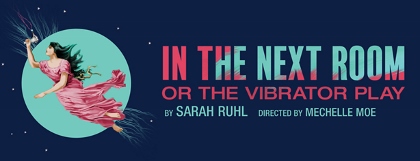
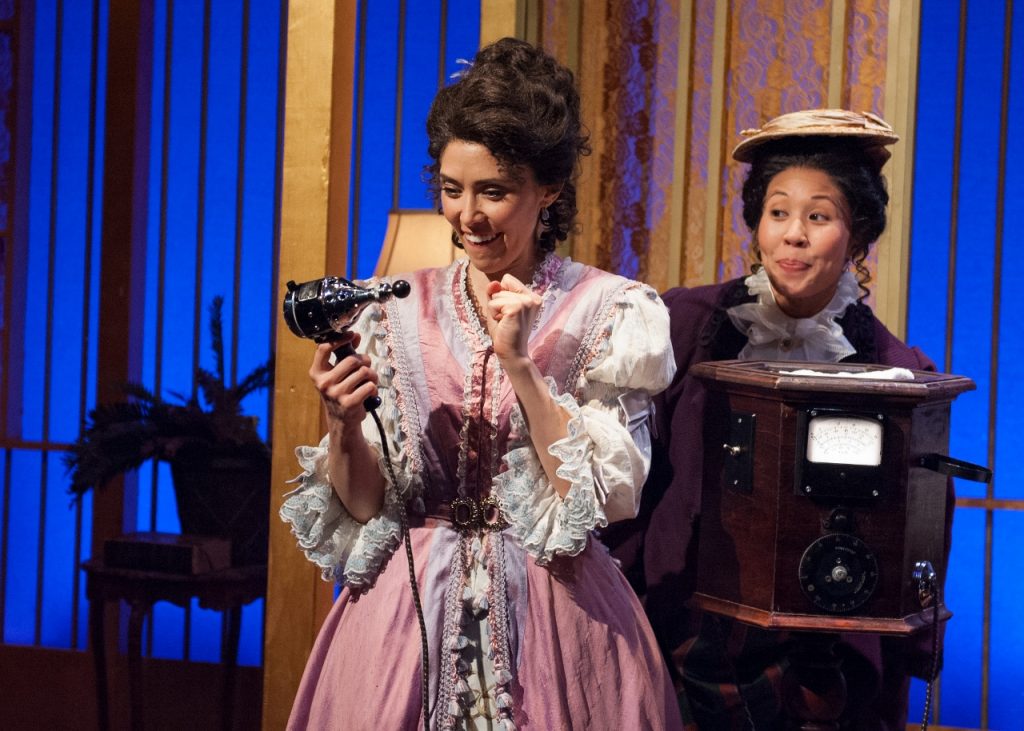
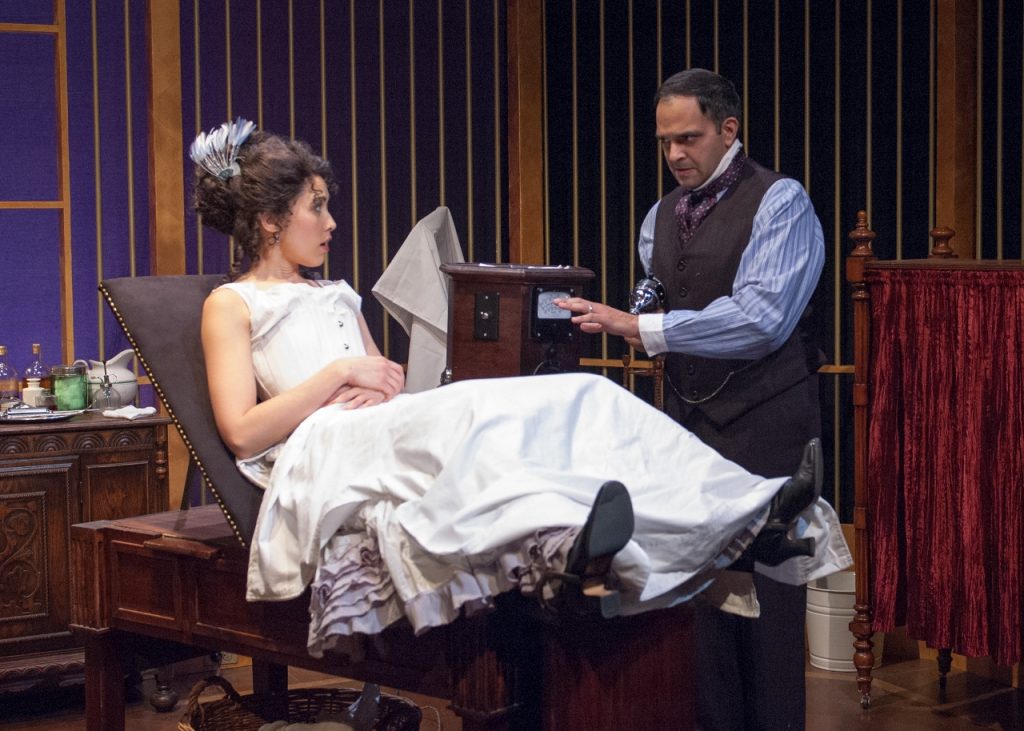
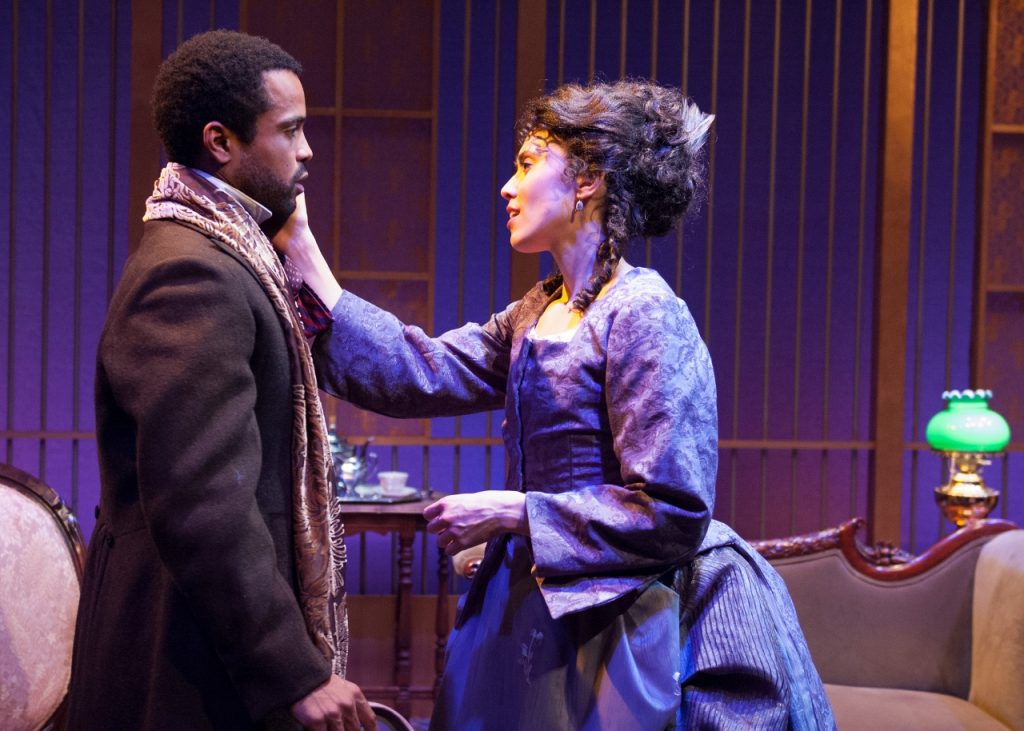
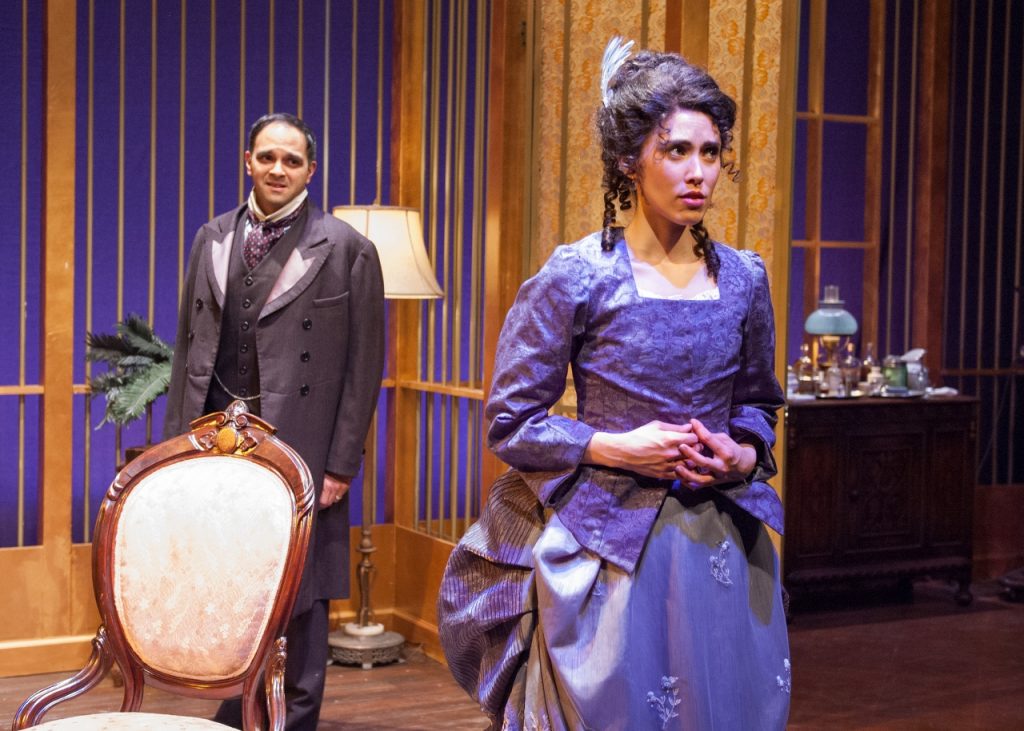
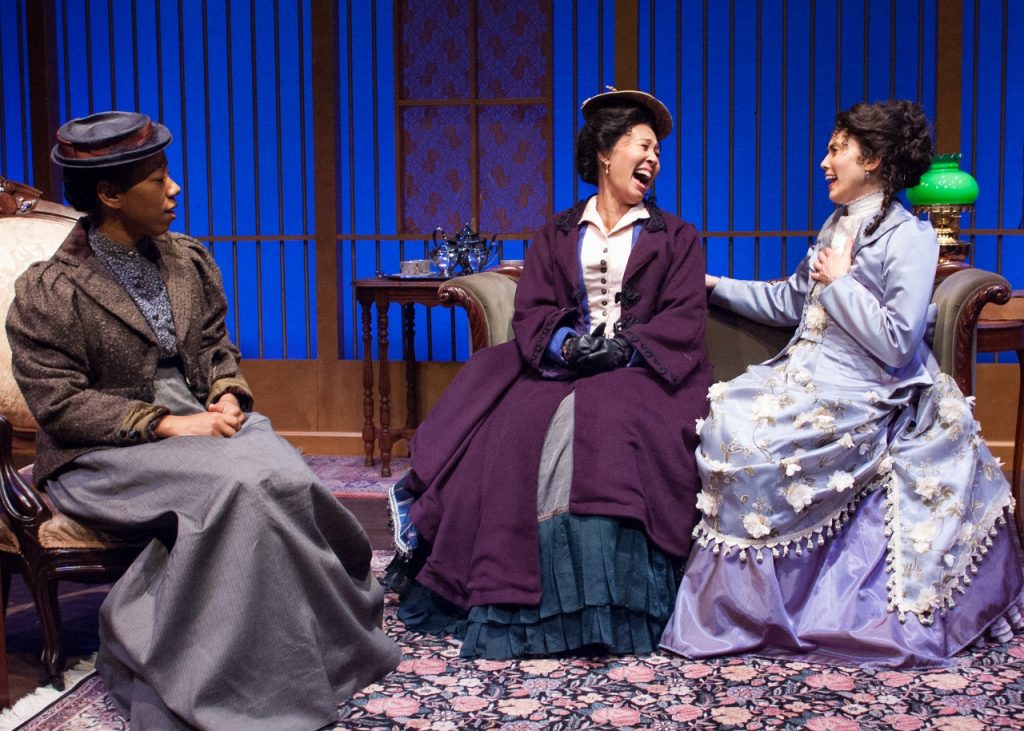
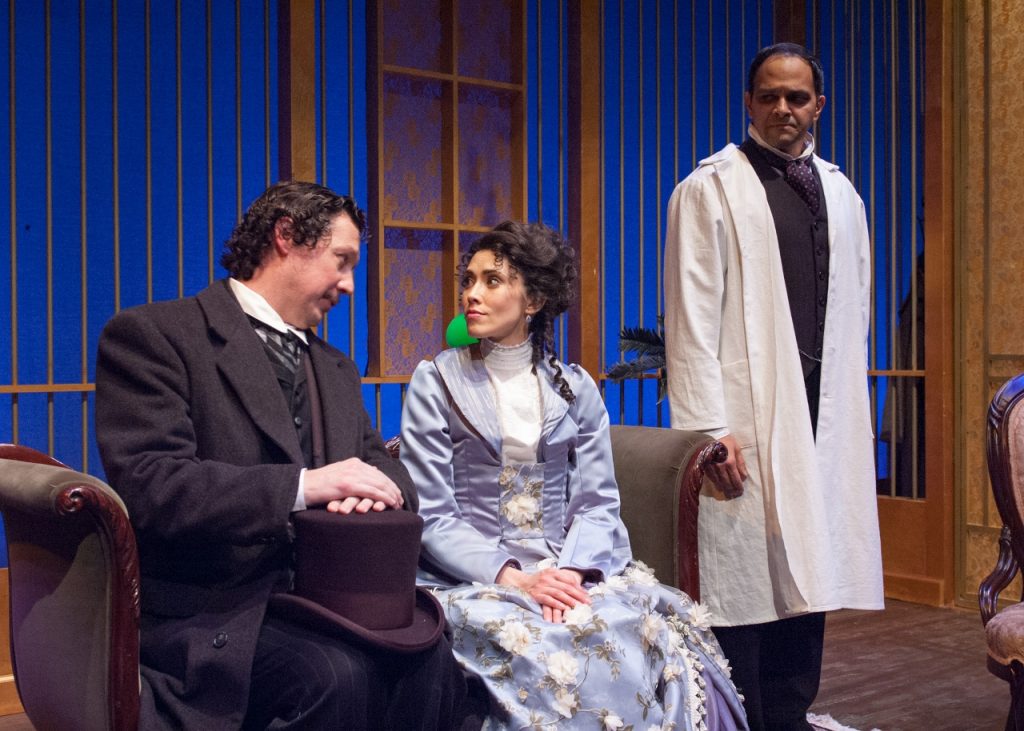
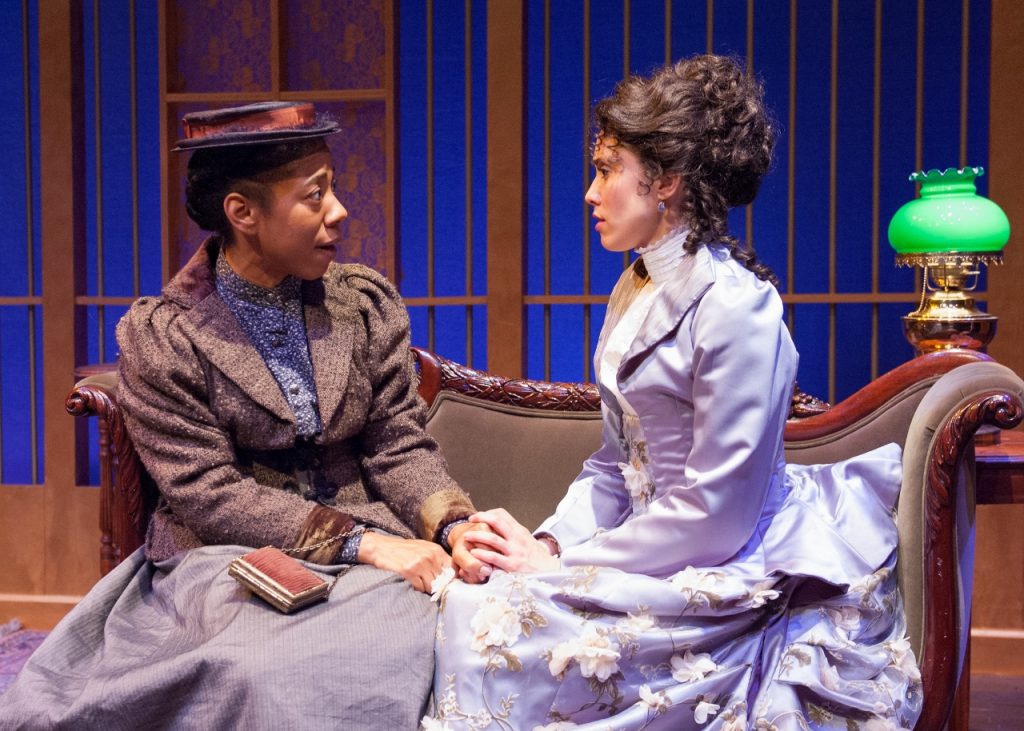
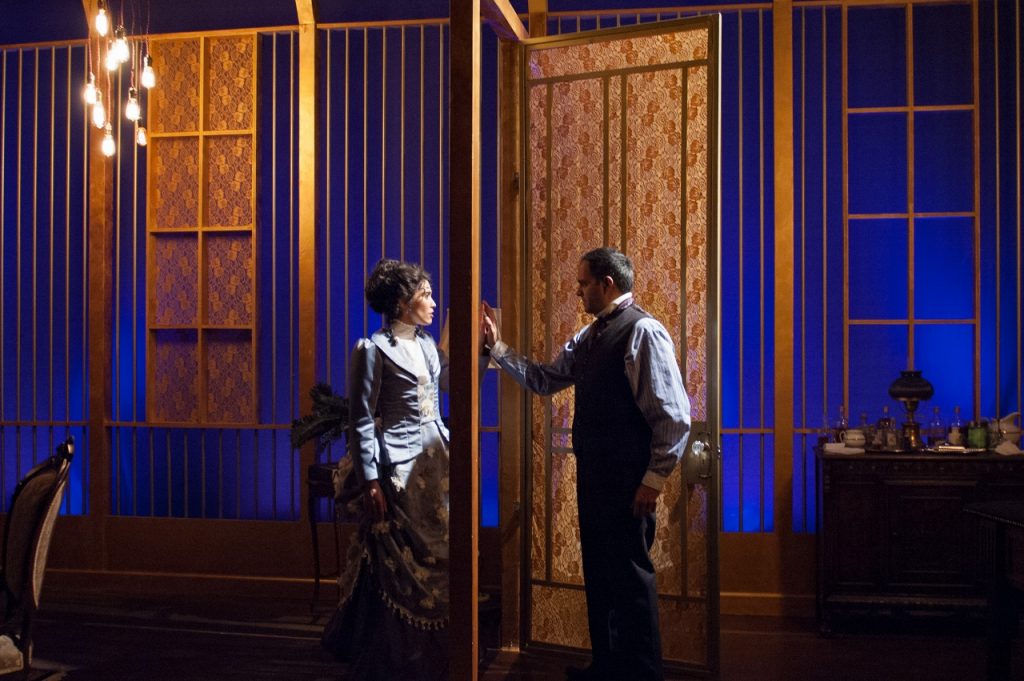


{ 4 comments… read them below or add one }
Oh, that last line, so well written. Thank you.
My pleasure, especially considering the source of the compliment…
Don’t you mean vulvar massage? The site of uvular massage would be the throat. And we hardly agree with your somewhat positive review. We found most of the characters, especially Catherine, to be cartoonish stereotypes. The serious and emotionally charged subject of the African-American wet nurse was treated cavalierly and felt tacked on to the main plot, and overall this was a silly play that was far too long. A fascinating subject, a missed opportunity and an altogether torturous theater experience.
After a brief examination…in the dictionary that is…the word would be “vulvular.” Thanks for pointing that out, Fran. (The way it was originally written as “uvular” has been removed, but doesn’t that sound like a plot of a Linda Lovelace movie?)